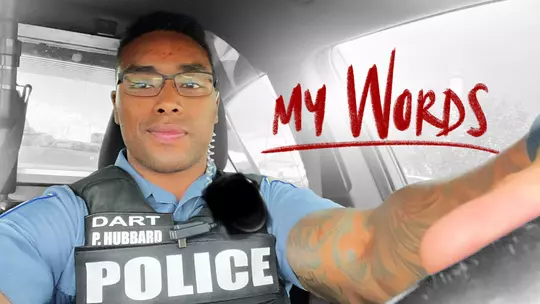
BHM is also about making the next generation better
By Paul Hubbard, Football '07
2/16/2022
For as long as I can remember, I wanted to be a police officer. I had a sense early on that it came with risks and challenges, but public service runs deep in my family even though it has come with great sacrifice.
My grandfather joined the Army even though he was told by his superiors that he couldn’t be anything more than a cook because he was Black.
My mother once thought about joining the Black Panthers – one of the original purposes of that radical revolutionary party of the late 1960s was to patrol vulnerable neighborhoods and protect residents from police brutality – but she wound up following her father’s path into the Army because she wanted to make our world a better place.
My mom was stationed at a base in Korea when she met my dad, who had enlisted because he also wanted to do something for the greater good.
My parents, Paul and Jacqueline, raised me not to see color as something to separate us. ... They taught me that if you really want to make a difference in the world, you have to go out there and make it yourself. You’re going to get a lot of friction and face a lot of adversity in the process, but you must find a way to persevere.Paul Hubbard
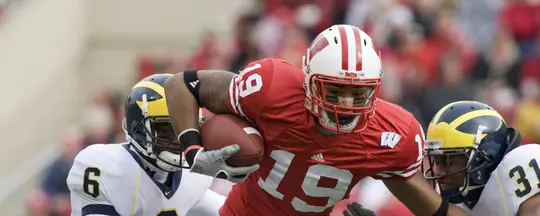
In turn, my parents, Paul and Jacqueline, raised me not to see color as something to separate us.
These are the people who first began building the foundation on which I now stand. They taught me about selflessness and diligence. They taught me about honor, courage and pride. They taught me that if you really want to make a difference in the world, you have to go out there and make it yourself. You’re going to get a lot of friction and face a lot of adversity in the process, but you must find a way to persevere.
I began learning about perseverance at an early age, long before I was a two-sport student-athlete at Wisconsin and was drafted to play in the NFL.
S/O to my followers on Instagram for a few of these cool edits of me! #Blessed #BadgerNation #BillsMafia pic.twitter.com/cO3kZqoh8w
— Paul Hubbard (@PaulHubbard_III) April 6, 2014
While my parents were stationed in Germany, I became so sickly that I actually spent months living in a hospital. I can remember vividly having to walk down the hall with one of those IV poles on wheels. I had birthdays in there. I think I had a Christmas in there because I remember getting gifts. I remember getting shots all the time.
I had all sorts of issues. Bronchitis. Severe asthma. All kinds of stuff. I remember the doctors telling my parents that it might help if we lived in a higher altitude. They ultimately got stationed in Colorado Springs, Colorado, where the elevation is more than 6,000 feet above sea level and nearby Pikes Peak is round 14,000 feet. It’s been my home ever since.
Another lesson in perseverance came in 2013. I was driving to see my mom in Virginia Beach, Virginia, when my Dodge Charger hit a patch of water on the road and began to hydroplane. A witness said the car rolled seven or eight times. I woke up in a hospital trauma ward where I spent 2½ weeks hooked up to more machines. It took me 18 months to recover.
Those experiences helped me keep it together during an excruciating period that started with my divorce late in 2019. I then proceeded to lose 16 people in my life – family members and close friends – to various illnesses and tragedies. My grandmother, Alexine Hubbard, and my little cousin, Jocari Hubbard, were among them. Losing my grandmother was very hard. Jocari was the victim of gun violence in Chicago. His death came three days after Vincent Jackson, my friend and former high school teammate. He had a tremendous career in the NFL, but died 12 months ago in part due to a brain injury – chronic traumatic encephalopathy – and alcohol abuse.
My ability to press on was further tested last spring during the nationwide uproar over the murder of George Floyd at the hands of Minneapolis police. I remember working 22 hours straight the first day of the protests and will never forget how police officers were treated.
I was called every terrible thing under the sun. I was called an “Uncle Tom” by minority folks and Black folks. I was called the N word. We had bottles of urine, frozen bottles of water and rocks thrown at us. We were shot at. At one point an M-80 thrown at me, blew up in my face and that of another female officer. Thank God for our helmets and face shields.
It was a difficult time for me. I was told I was on the wrong side – that I chose the wrong side – by white people. I explained to them, “You don’t get to tell me what side I get to choose.” One protester, a female, asked me to kneel with her and I refused. But I took off all my riot gear and moved toward her. I said, “I’m not going to kneel with you because, first off, I was born Black and I’m Black right now and I’m going to die Black. That’s never going to change.”
I asked that girl, “What are you trying to accomplish?” She didn’t have an answer. She said, “I’m just angry that all these things are happening and you should be angry because you’ve been treated badly for so many years.” I said, “You don’t have to tell me to be angry. I am angry for a lot of reasons that you’ll never fathom.”
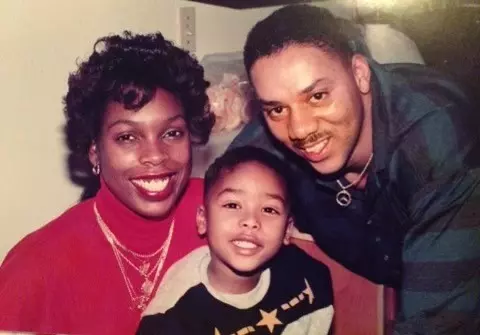
But anger won’t get you very far in this life. Perseverance will. Having an empathetic heart will. Having an open mind will. That’s what I want this story to be about because with those things, I know that great things can come out of the worst situations. Even if you’re at odds with someone, if they have those three things they’re more likely to respect and accept your differences because they have the same struggles.
One thing about learning how to persevere, about having an empathetic heart and an open mind, is now you’re able to understand that just because you don’t do it or see it, you can’t discredit another who has.
For me, Black History Month is more than recognizing the legendary people of the past and shining a light on their deeds. ... It’s one of those things where I feel we should be more inclined to make the next generation better.Paul Hubbard
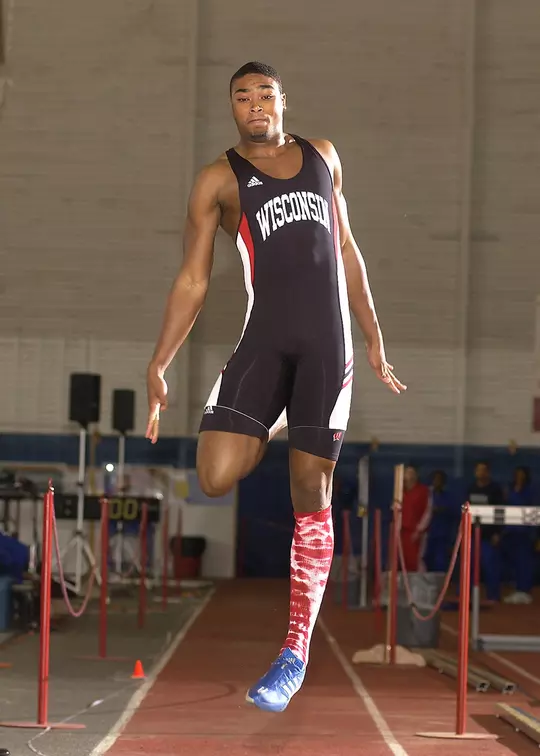
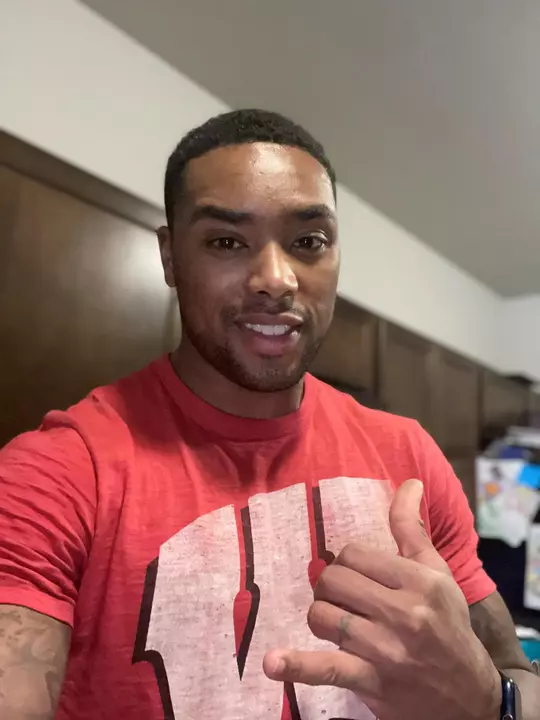
For me, Black History Month is more than recognizing the legendary people of the past and shining a light on their deeds. It’s more than recognizing icons like Chadwick Boseman, the Tuskegee Airmen, Martin Luther King Jr., Condoleezza Rice, Nelson Mandela, John Lewis and Muhammad Ali.
It’s one of those things where I feel we should be more inclined to make the next generation better. Not just by telling them these stories about people who did all these great things back then, but talking about people doing vital things now.
More importantly, we need to talk about how these people got into these positions in the first place and how they’re able to be so successful and how they’re maintaining such a positive life and doing all these great things. Where did they start, how did they get there and how do they stay where they are? They struggled, but how did they overcome those struggles?
I look back on my athletic career with a measure of amazement. I was a late bloomer. I wasn’t the most talented person on any playing field or in any sport, but I found my way. I was recruited to Wisconsin for track and field, specializing in the long jump and triple jump, and eventually walked on to the football team as a wide receiver.
My time in Madison, from 2003 to ’07, was special. Barry Alvarez, Paul Chryst, Henry Mason and Ed Nuttycombe are among my favorite coaches of all time. I learned things from them that I probably wouldn’t have learned anywhere else.
I crossed paths with some incredibly talented teammates at Wisconsin – Lee Evans, Jim Leonhard, Joe Thomas, Brian Calhoun, Gabe Carimi, Travis Beckum, Erasmus James, P.J. Hill and Dan Buenning to name a few – but I remember being heavily influenced by guys who weren’t necessarily stars.
Jake Wood was a backup offensive lineman and long snapper, but he’s one of my heroes because of his military service and the incredible impact he’s had on the world with Team Rubicon. He does all three of the things I’m talking about: having empathy, an open mind and the instincts to persevere.
Several former teammates are, like me, in public service. Kalvin Barrett is the now the Dane County Sheriff. Jonathan Clinkscale and Jason Palermo are firemen in Madison. Jaevery McFadden is a police officer in Miami. The list goes on.
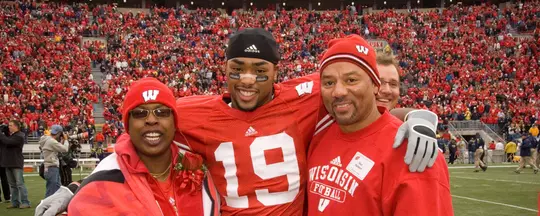
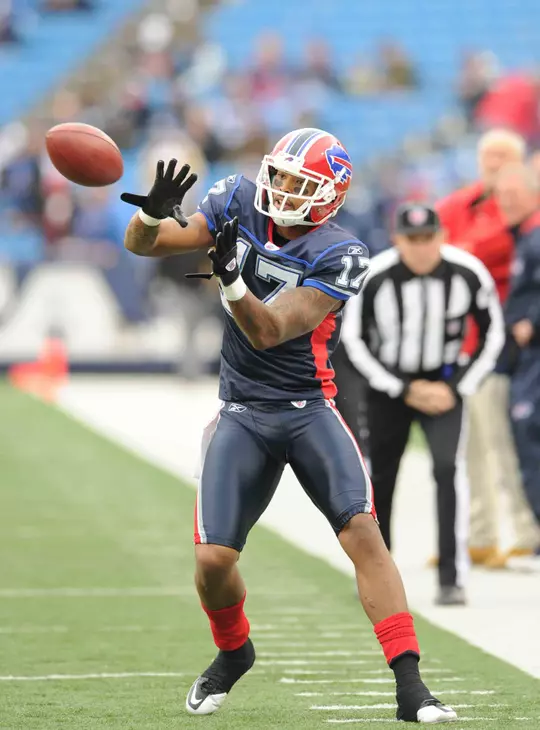
I was at Wisconsin during a special, magical time. We dominated the Big Ten Conference in men’s track and cross country. The men’s and women’s hockey teams won national titles. Men’s basketball and football were solid. The caliber of people that these programs had was remarkable.
Playing football for the Badgers opened a door to the pros, which is kind of crazy when I think about growing up so feeble. I was drafted by Cleveland in the sixth round in 2008 and spent time in Buffalo and Oakland as well as Winnipeg of the Canadian Football League. I enjoyed the experience, but always knew football wasn’t forever.
In the process of getting my undergraduate degree from Wisconsin in sociology and a certificate in criminal justice, I worked as an intern at the Madison Police Department. I earned my master’s degree in criminal justice in 2016 and spent time as a clinical youth security officer in Colorado Springs before becoming a police officer.
Because of my background in sports, people ask me all the time about being coach. They say, “You could be affecting the lives of young men and women by being a coach.” I say to them, “Yeah, but that’s not my calling.”
Frankly, I don’t know what my purpose is yet and I don’t think anyone of us will know what our purpose is until we’re done and gone. That’s when people will look back and say, “That’s what they were here to do.”
We all have an idea of what our purpose is and what we want to do. I just want to make sure that what I do, despite what I have going on in my life, is purpose driven and is what God has in store for me. I know I want to be somebody with an open mind and an empathic heart who knows how to persevere.
I’ve come to the conclusion that with some of the most important things in life, you’re not always going to get positive reinforcement. In those moments you have to keep putting one foot in front of the other and continue to give more than you take from others.Paul Hubbard
Gallery: Wisconsin Student-Athlete Unity Rally
I think we all have to try and foster change. I took that to heart a long time ago. One generation has to make the next one better. Sadly, I think we’ve hit a stalemate in that regard. We’re at a point where we have to confront the difficult questions rather than retreat or side-step them. That requires sacrifice, leadership and bravery.
The best leaders are the ones who go out there and they do. They don’t just ask of the people behind them or underneath them. They lift everyone up to the same shelf, then they go out and do what’s needed to bring us all together.
It’s depressing for me to know that a police officer is seen as one of the most hated professions in the world right now. No one deserves to be treated that way, especially when you consider all the burdens we carry with no complaint. We all make mistakes. We all deserve a second chance. I believe the more you humanize a police officer, the more effective they’re going to be in your communities.
I’ve come to the conclusion that with some of the most important things in life, you’re not always going to get positive reinforcement. In those moments you have to keep putting one foot in front of the other and continue to give more than you take from others.
If you do so with an emphatic heart, an open mind and the ability to persevere, the journey will be your reward.

































































































































































































